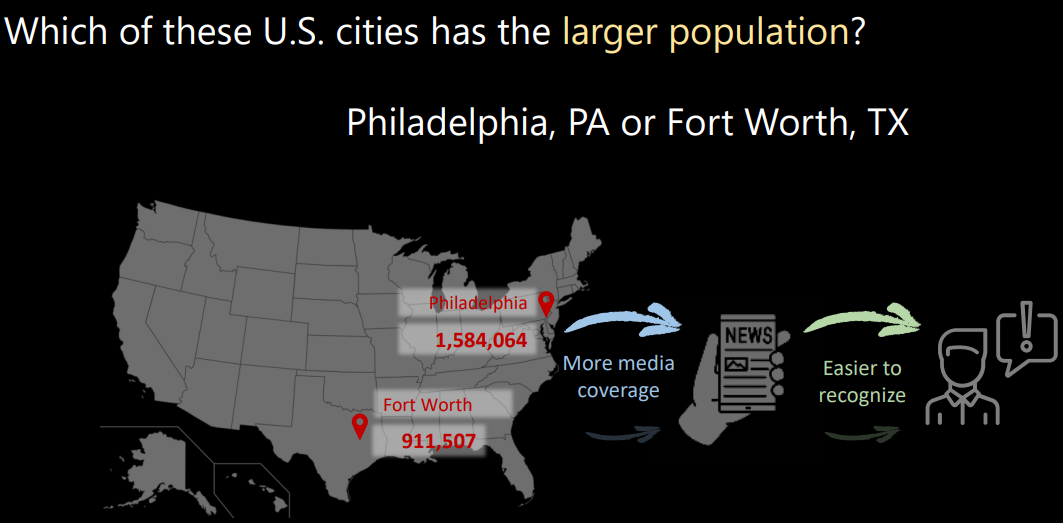Topic 2 Individual Problem Solving
Problem solving is difficult because more often than not, there’s just not enough information to go around. And where there isn’t enough information to go around, people rely on something called heuristics to deal with uncertainty.
Two researchers - Kahneman and Tversky - mention that heuristics results in bad decisions more often than not, while another duo of researchers - Gigerzerner and Brighton - mention that heuristics is an “excellent cognitive tool”. Kahneman and Tversky say that it’s because of heuristics that humans are crappy decision makers: because we rely too much on heuristics and not enough on critically analyzing things.
However, it’s worth noting that for many problems in real life:
- There isn’t enough information to make informed decisions.
- There isn’t enough time to analyze problems.
It’s also for this reason that Gigerzerner and Brighton argue that heuristics - despite the fact that it’s the only available cognitive tool for decision making - argue that it may work very well sometimes.
2.1 Heuristics of Judgement Making
Kahneman and Tversky list three different kinds of heuristics that people use in order to make decisions when there’s just not enough information.
The above YouTube video was shown in class and recaps the points on heuristics talked about in class:
2.1.1 Representativeness
This heuristic states that people generally think that two things are more alike than they actually are.
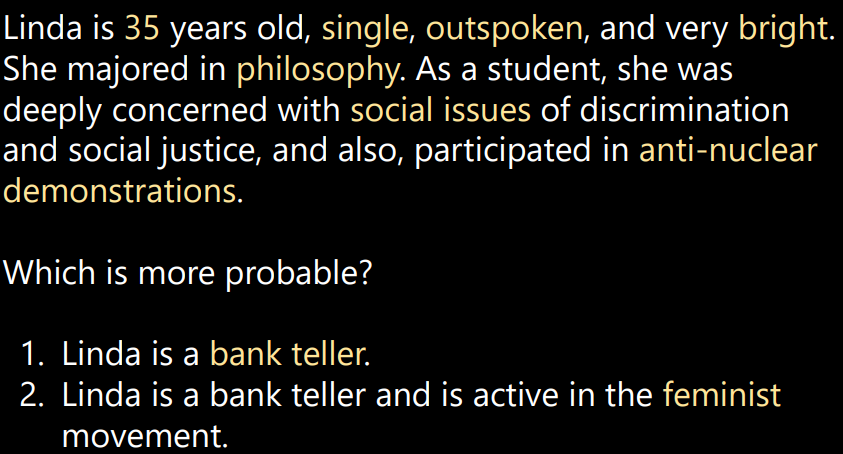
Figure 2.1: Example of a Representativeness Heuristic
In the above example, one might be tempted to think that option “2” is the better of the two choices, yet there is no guarantee that Linda will actually be a part of the feminist movement. This is an example of a representativeness heuristic - we believe that two things aremore closely related than they might be.
2.1.2 Availability
This heuristic states that people are more likely to make their decisions based on what is the easiest to remember.

Figure 2.2: Example of an Availability Heuristic
In the above example, it’s more likely that option “1” is the likelier of the two choices.
2.1.3 Adjustment and Anchoring
This heuristic states that people often make their choices by starting from a bad initial value (i.e., a super bad guess) and then insufficiently adjusting their original guesses.
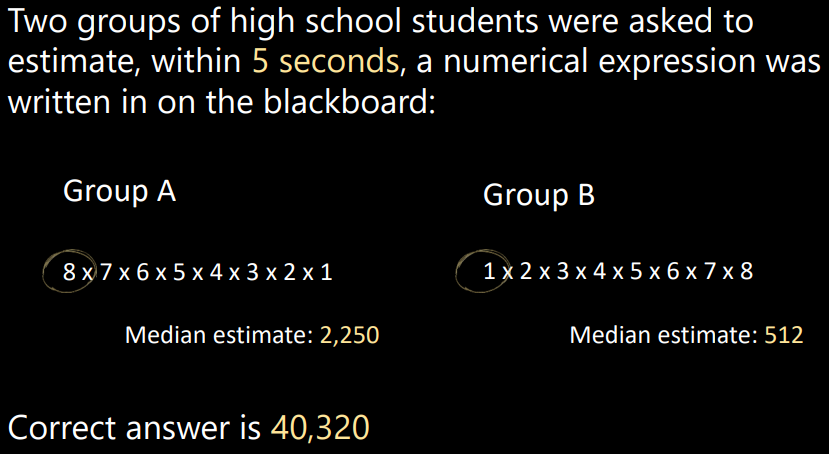
Figure 2.3: Example of an Adjustment and Anchoring Heuristic
In the above example, we see that the order of the numbers do matter when asking that question. Whereas the students overestimated the actual product in the first example, the students underestimated the amount in the second example (since the smallest numbers were listed first).
2.1.4 Loss Aversion
People tend to be more fearful of losing something than gaining something. Because of this, people tend to behave differently and can sometimes make irrational decisions when faced with losses.
2.1.5 Homo Heuristics
This was term coined by Gigerzerner and Brighton some time during 2009. This just refers to humans using heuristics to go about their everyday tasks.
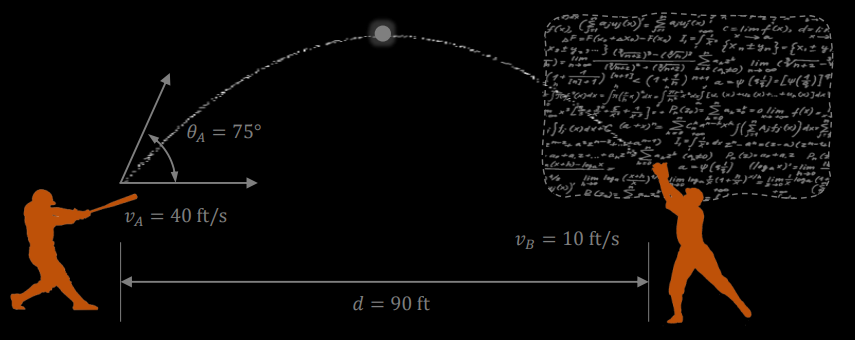
Figure 2.4: Differential Equations in Play During Baseball
For instance, there are several differential equations that govern ball velocity during a game of baseball, yet baseball players don’t do math with pen and paper during a game of baseball. Instead, they rely on a pretty simple heuristic that goes something like this:
- Fix your gaze on the ball (i.e., keep your eye on the ball).
- Adjust your running speed so that your viewing angle is more or less the same as the ball changes position in space.
2.2 Collective Intelligence
Individuals may not be super smart or strong enough to survive by themselves. However, when many people pool their efforts together, they can do so much more than any one person can do even without leaders (e.g., government).
2.2.1 Vox Populi
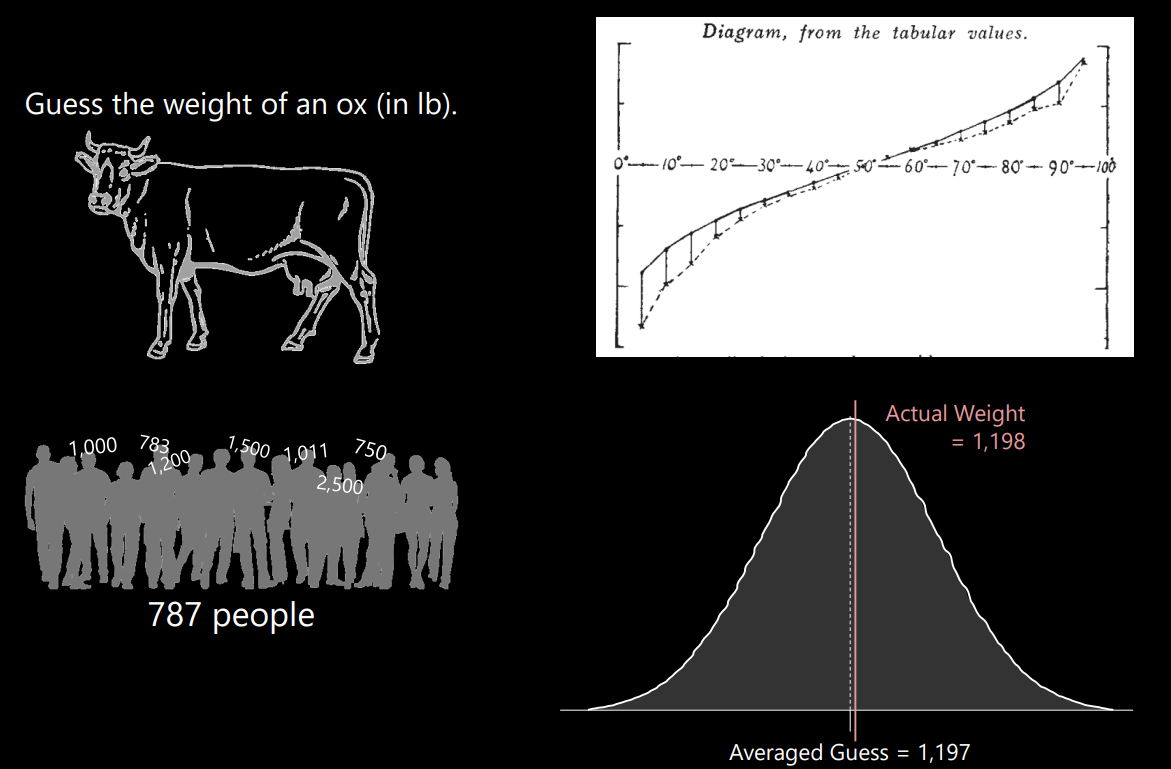
Figure 2.6: Example of Vox Populi
This was a concept conined by the French statistician Francis Galton - during a contest where participants were asked to guess the weight of an ox in pounds, he found that if he took the participants guesses and found their median, that the median would be very close to the actual weight of the ox.
2.2.2 Conditions for Crowd Intelligence
For the Vox populi principle mentioned in the previous sub-subsection to be true, six conditions need to be met:
Group Diversity
There has to be enough diversity within a group - enough people from different ages, genders, religions, and other backgrounds that can contribute their own thoughts to a problem.
Group Sixe
The more people there are in a group, the less likely it is that the same ideas will keep popping up. On top of that, more people makes it more comfortable for others to express their opinions in.
Group Structure

Figure 2.7: Two Main Structures of Groups
If a group is hierarchical (i.e., everybody reports to a higher-up of some sort), this may not be beneficial as people are essentially coerced into agreement even though they may have better ideas.
If a group is more “horizontal” to speak of, then it’s likelier that everybody will have equal opportunities to speak their minds.
Independent Thinking
Every member of the group needs to be willing to share their own thoughts.
Group Coordination
Goals need to be shared within members so that it’s easier for them to remember what it is that they need to do. Plus, those goals need to be realistic and fair (i.e., one person cannot just be tanking all the work).
Cooperation and Trust
The cooperative benefit says that if you trust someone else, then you can use their skills and their knowledge for your own problems and also offer something in return.
When members are more willing to help one another, the group can achieve tasks more easily and also more effectively.
